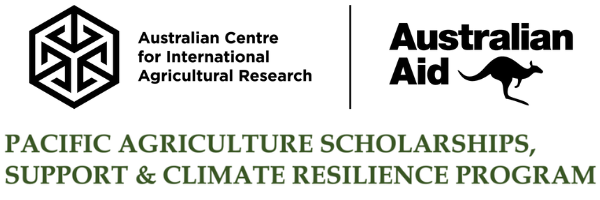Horticultural solutions to crop pests & other climate impacts in the Pacific
Entomologist Leikitah Katah Naituku is among a new generation of higher degree researchers working to enhance food and agricultural systems in the Pacific.
In 2023, Leikitah will broaden her horticultural research to explore potential solutions to emerging climate challenges as an inaugural winner of the ACIAR Future Thinkers’ Award.
Lei receiving her Future Thinkers’ Award
Leikitah is a PhD candidate at the University of the South Pacific, where she investigates broad mites on capsicum as part of an ACIAR project aimed at Responding to emerging pest and disease threats to horticulture in the Pacific lslands.
Originally from Vanuatu, Leikitah lives in Fiji with her husband and three children.
Prior to being awarded a PASS-CR scholarship, Leikitah worked as an entomologist and completed a master’s thesis on the Abundance, damage, and control of broad mite of capsicum in Samoa.
As a PhD candidate, Leikitah is deepening her investigation of broad mites as pests of capsicum in Fiji, specifically researching species identification, seasonal abundance, and management under protected structures.
“Areas like agriculture, forestry, fisheries and horticulture, are vital to livelihoods and form the backbone of most national economies in the Pacific,” Leikitah said.
“I remember the struggles my parents faced as smallholder farmers, dealing with pests, diseases and declining soil fertility in a changing climate, and that’s what drew me to this area of academia.”
In 2023, Leikitah will have the opportunity to expand her horticultural research to include a specific focus on climate change, since being named a Future Thinker for Pacific Climate Resilience.
Investing in Climate Resilience for the Pacific agricultural research sector
Launched in 2022, the ACIAR Future Thinker’s Awards is a competitive awards program designed to enhance PASS-CR scholars’ specific skills and knowledge of climate change methodologies and approaches.
The program aims to fully equip and support emerging leaders in agricultural science to drive successful climate resilience and food systems change initiatives in the Pacific.
With the award, scholars can build a dedicated climate focus into their research, with a view to also producing research that directly influences planning and decision making at a community, national and regional level.
By supporting specialised research projects, the Future Thinkers’ Awards help awardees develop valuable climate research and leadership skills that can lead them to access additional climate funding and drive positive change throughout their research careers.
Leikitah with Lisa Ward and Linda Wess at Koronivia Research Station, Suva
Stepping up to address climate impacts as a leader in Pacific horticulture
As a Future Thinker awardee, Leikitah will learn about and apply climate change mitigation and adaptation approaches to treating broad mites in capsicum farming in Fiji.
Her winning project focuses on mitigating climate change by converting kitchen waste into Vermicompost – a plant matter rich in beneficial microbes that can promote plant growth, reduce plant stress, and suppress various pests and diseases.
“Generally, there are few management options available in Fiji for the control of broad mites, and most chemicals listed locally for broad mite control are in fact insecticides. Vermicompost tea has great potential to manage broad mites but it’s difficult to source locally,” Leikitah explained.
With the award, Leikitah will develop sustainable and affordable vermicompost bins and an accompanying instructional manual for smallholder capsicum farmers and backyard gardeners in Fiji.
“My hope is that my research will help sustainably improve the livelihoods and food security of backyard gardeners and smallholder farmers in Fiji, while reducing organic waste and greenhouse gas emissions,” she said.
Leikitah examining seedlings with her supervisor Dr Mereia Fong and fellow PhD scholar Aradhana Deesh
Designing strong proposals for successful outcomes
Leikitah inspecting her seedlings
Capacity building is at the heart of the PASS-CR program and woven into all aspects of the Future Thinkers’ Awards program, beginning with the competitive application process.
Applicants participated in a workshop series to learn the principles and practice of climate research as it applies to agriculture, and then developed their research concepts in one-on-one mentoring sessions.
Leikitah’s project was tailormade with a view to developing a wide range of skills, both technical and personal, as well as her personal influence and leadership capacity.
“For someone with just a basic knowledge of climate change, the application process was challenging but a great learning process in itself,” Leikitah said.
“During the initial workshop with Dr Dani, I remember feeling lost. I struggled to understand the concept of impact chains or how to link my research to climate change.”
“It took me two mentoring sessions with Dr Dani to properly grasp the concepts and to develop my proposal.”
A range of climate resilience research proposals were assessed by the international assessment panel. Leikitah was named among three inaugural winners and celebrated at an awards ceremony in Fiji.
“My key takeaway has been that, when applying a climate change lens to any project, one should never assume that any one thing will be the solution,” Leikitah said of her involvement in the program so far.
“The key is to consider how any research or activity will fit as part of a holistic systems approach. I am excited for this opportunity to contribute and make a difference in my community,” she said.
Leikitah’s research will continue in 2023.





